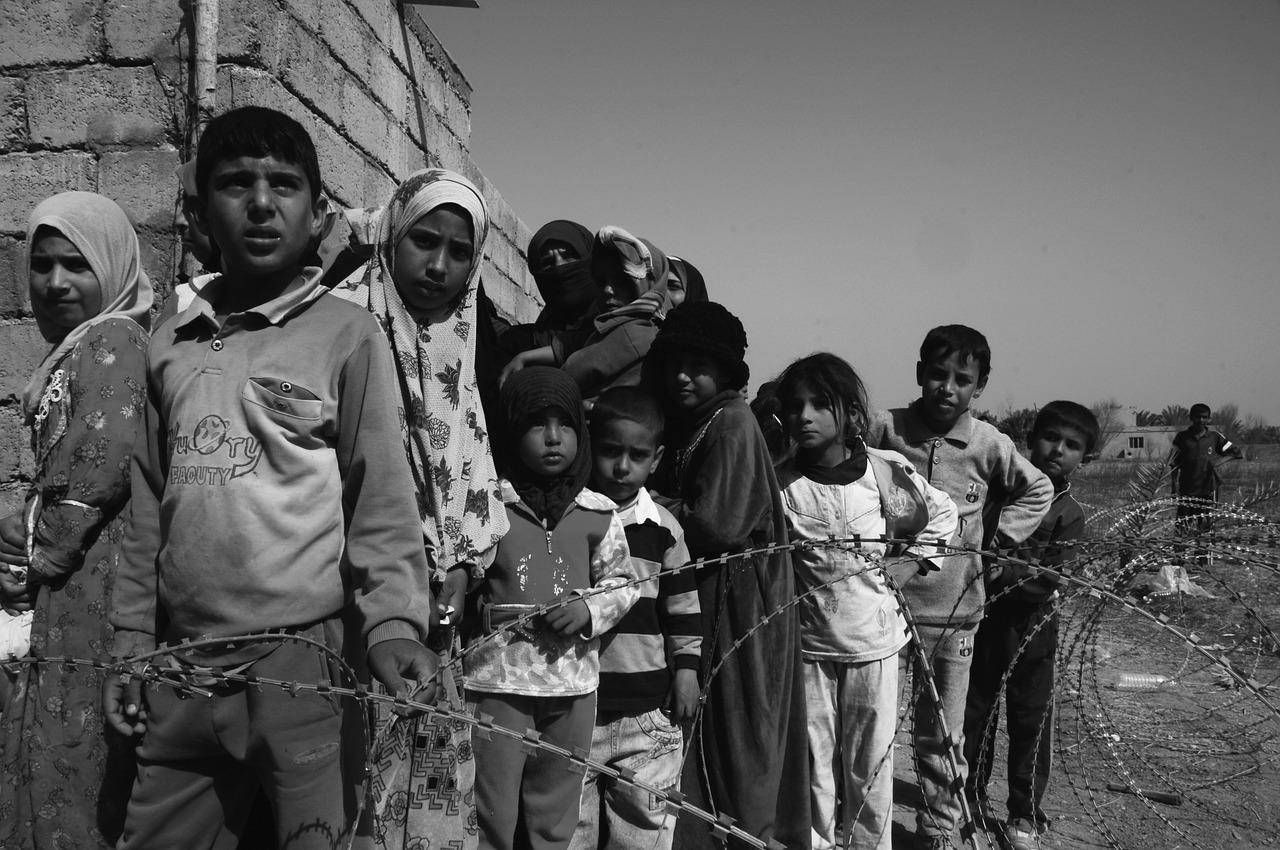お知らせ・読み物
次に食事ができる日は?アフガニスタン食糧危機。What day will you be able to eat next? Afghanistan food crisis.
2019年12月4日、中村哲医師は、アフガニスタン東部ナンガルハル州ジャララバードを車で移動中、武装グループから銃撃を受け、亡くなった。
中村医師は、1980年代から、パキスタンやアフガニスタンで、貧しい人々の診療にあたっていたが、アフガニスタンが厳しい干ばつに見舞われた2000年頃から、独学で土木技術を学び、2003年からアフガニスタンで用水路の整備や農地の再生に取り組み始めた。川から作物を作るために必要な水をひき、余った水は川に返す循環型のシステムにより、乾きはてて荒れた農地に緑をよみがえらした。中村医師の用水路は、およそ65万人の命と生活を支えることとなった。支援だけでしか生きていけなかった貧しい人たちの食料自給を向上させた。
中村医師が残した言葉は、
「水が善人・悪人を区別しないように、誰とでも協力し、世界がどうなろうと、他所に逃れようのない人々が人間らしく生きられるよう、ここで力を尽くします。内外で暗い争いが頻発する今でこそ、この灯りを絶やしてはならぬと思います。」
さて、中村医師が変えてきたアフガニスタンの今はいかに?
アフガニスタンでは、昨年8月、反政府勢力だったタリバン(最高指導者はアクンザダ師)が政権を掌握した。タリバン政権は、2001年9月11日にアメリカの世界貿易センターを爆破した同時多発テロ事件の首謀者でアルカイダの指導者「オサマ・ビンラディン」をかくまったことで、アメリカから攻撃を受け、首都カブールを追われた末、同年12月に崩壊した。その後、20年間は、アメリカが打ち立てた新政府がアフガニスタンの政権を担ったが、アメリカ軍が撤退を始めるとともに、タリバンは攻勢を強め、昨年、政権に返り咲いたのだ。
イスラム主義勢力のタリバンが復権したことで、国際社会は、アフガニスタンが再びテロの温床になる懸念を示し、アフガニスタンへの支援を見合わせ、アフガニスタン中央銀行の国外資産の凍結にも踏み切った。その影響で、アフガニスタンの経済は崩壊に向かい、治安も悪化している。その上、アフガニスタンは、過去30年で最も深刻な干ばつに見舞われ、下水の枯渇も進行。作物の収穫や安全な水の確保ができなくなり、飢餓と水を媒介とする病死が増加。人口の55%に当たる2440万人が人道支援を必要、390万人の子どもを含む470万人が急性の栄養失調、今の状態が続けば、13万人の子どもが死に直面する窮状となった。
世界の関心はウクライナ戦争に集中しているが、アフガニスタンも、かつてないほどの人道支援ニーズが高まっているのである。
日本は、昨年10月、国連世界食糧計画(WFP)や国連児童基金(UNICEF)など計7機関を通じ、アフガニスタン及び近隣に、6500万ドル(約71億円)の緊急無償資金協力を決定。米国は、今年2月、米国内で凍結しているアフガニスタン中央銀行の資産約70億ドル(約8千億円)のうち約35億ドルをアフガニスタンの人道支援に活用する方針を発表(残る約35億ドルは、米同時テロの犠牲者の賠償請求の対象として米国内に保管する意向)するなど、人道支援の大きな動きはあるものの、人道支援目的の活動資金は、今も、不足の状態にある。
中村哲さんの残した「他所に逃れようのない人々が人間らしく生きられる」といった言葉には、支援に依存し続けなければ生きていけない人々の不幸を語っている。物資支給だけではなく、貧しい人たちが、自分達で生きていけるように変えていく支援が、とても重要ではないか?中村医師の志の実現は、中村医師の活動を支援してきた福岡市の国際NGO「ペシャワール会」が、継続している。
On December 4, 2019, Dr. Tetsu Nakamura died after being shot by an armed group while driving in Jalalabad, Nangarhar, eastern Afghanistan.
Dr. Nakamura has been treating poor people in Pakistan and Afghanistan since the 1980s. Started to work on the regeneration of. He drew the water needed to grow crops from the river, and a circulating system that returned the excess water back to the river to bring green to dry and rough farmland. Dr. Nakamura's irrigation canal will support the lives and livelihoods of about 650,000 people. He improved the food self-sufficiency of the poor, who could only live on support.
The words left by Dr. Nakamura are
"We will cooperate with everyone so that water does not distinguish between good and bad people, and we will do our best here so that people who cannot escape to other places can live like human beings. There are frequent dark conflicts inside and outside the world. Now is the time to turn off this light. "
The realization of Dr. Nakamura's ambitions is being continued by the international NGO "Peshawar-kai" in Fukuoka City, which has supported Dr. Nakamura's activities.
How is Afghanistan now changed by Dr. Nakamura?
In Afghanistan, the rebel Taliban (Supreme Leader Akhnzada) came to power last August. The Taliban administration was attacked by the United States after hiding the al-Qaeda leader Osama bin Laden, the mastermind behind the terrorist attacks on September 11, 2001, which blew up the World Trade Center in the United States. After being chased by Kabul, it collapsed in December of the same year. For the next 20 years, the new government established by the United States took power in Afghanistan, but as the US military began to withdraw, the Taliban intensified its offensive and returned to power last year.
With the reinstatement of the Islamist Taliban, the international community has expressed concern that Afghanistan will once again become a hotbed of terrorism, has forgotten support for Afghanistan, and has decided to freeze foreign assets of the Central Bank of Afghanistan. As a result, Afghanistan's economy is heading for collapse and security is deteriorating. What's more, Afghanistan has suffered the most severe drought in the last 30 years and is depleting sewage. It becomes impossible to harvest crops and secure safe water, and hunger and water-borne illnesses increase. 24.4 million people, 55% of the population, need humanitarian assistance, 4.7 million, including 3.9 million children, are acutely malnourished, and if the current situation continues, 130,000 children will face death. ..
While the world's attention is focused on the Ukrainian War, Afghanistan also has an unprecedented need for humanitarian assistance.
In October last year, Japan decided to provide $ 65 million (about 7.1 billion yen) in emergency grant-in-aid for aid to Afghanistan and its neighbors through a total of seven organizations, including the United Nations World Food Program (WFP) and the United Nations Children's Fund (UNICEF). In February of this year, the United States announced a policy to utilize about $ 3.5 billion of the $ 7 billion (about 800 billion yen) assets of the Afghanistan Central Bank, which is frozen in the United States, for humanitarian assistance in Afghanistan. Although there are major movements in humanitarian aid, such as the intention to keep $ 3.5 billion in the United States as a target for compensation claims for victims of simultaneous US terrorism), there is still a shortage of funds for humanitarian aid activities. It is in.
The words left by Tetsu Nakamura, "People who cannot escape elsewhere can live like humans," describe the misfortune of those who cannot live without continuing to rely on support. Isn't it very important not only to provide supplies but also to support poor people so that they can live on their own?
On December 4, 2019, Dr. Tetsu Nakamura died after being shot by an armed group while driving in Jalalabad, Nangarhar, eastern Afghanistan.
Dr. Nakamura has been treating poor people in Pakistan and Afghanistan since the 1980s. Started to work on the regeneration of. He drew the water needed to grow crops from the river, and a circulating system that returned the excess water back to the river to bring green to dry and rough farmland. Dr. Nakamura's irrigation canal will support the lives and livelihoods of about 650,000 people. He improved the food self-sufficiency of the poor, who could only live on support.
The words left by Dr. Nakamura are
"We will cooperate with everyone so that water does not distinguish between good and bad people, and we will do our best here so that people who cannot escape to other places can live like human beings. There are frequent dark conflicts inside and outside the world. Now is the time to turn off this light. "
Now, how is Afghanistan changed by Dr. Nakamura?
In Afghanistan, the rebel Taliban (Supreme Leader Akhnzada) came to power last August. The Taliban administration was attacked by the United States after hiding the al-Qaeda leader Osama bin Laden, the mastermind behind the terrorist attacks on September 11, 2001, which blew up the World Trade Center in the United States. After being chased by Kabul, it collapsed in December of the same year. For the next 20 years, the new government established by the United States took power in Afghanistan, but as the US military began to withdraw, the Taliban intensified its offensive and returned to power last year.
With the reinstatement of the Islamist Taliban, the international community has expressed concern that Afghanistan will once again become a hotbed of terrorism, has forgotten support for Afghanistan, and has decided to freeze foreign assets of the Central Bank of Afghanistan. As a result, Afghanistan's economy is heading for collapse and security is deteriorating. What's more, Afghanistan has suffered the most severe drought in the last 30 years and is depleting sewage. It becomes impossible to harvest crops and secure safe water, and hunger and water-borne illnesses increase. 24.4 million people, 55% of the population, need humanitarian assistance, 4.7 million, including 3.9 million children, are acutely malnourished, and if the current situation continues, 130,000 children will face death. ..
While the world's attention is focused on the Ukrainian War, Afghanistan also has an unprecedented need for humanitarian assistance.
In October last year, Japan decided to provide $ 65 million (about 7.1 billion yen) in emergency grant-in-aid for aid to Afghanistan and its neighbors through a total of seven organizations, including the United Nations World Food Program (WFP) and the United Nations Children's Fund (UNICEF). In February of this year, the United States announced a policy to utilize about $ 3.5 billion of the $ 7 billion (about 800 billion yen) assets of the Afghanistan Central Bank, which is frozen in the United States, for humanitarian assistance in Afghanistan. Although there are major movements in humanitarian aid, such as the intention to keep $ 3.5 billion in the United States as a target for compensation claims for victims of simultaneous US terrorism), there is still a shortage of funds for humanitarian aid activities. It is in.
The words left by Tetsu Nakamura, "People who cannot escape elsewhere can live like humans," describe the misfortune of those who cannot live without continuing to rely on support. Isn't it very important not only to provide supplies but also to support poor people so that they can live on their own? The realization of Dr. Nakamura's ambitions is being continued by the international NGO "Peshawar-kai" in Fukuoka City, which has supported Dr. Nakamura's activities.
#アフガニスタン #干ばつ #経済崩壊 #タリバン #食糧危機 #人道支援 #中村哲 #Afghanistan #Drought #EconomicCollapse
#Taliban #FoodCrisis #HumanitarianAid #Tetsu_Nakamura








